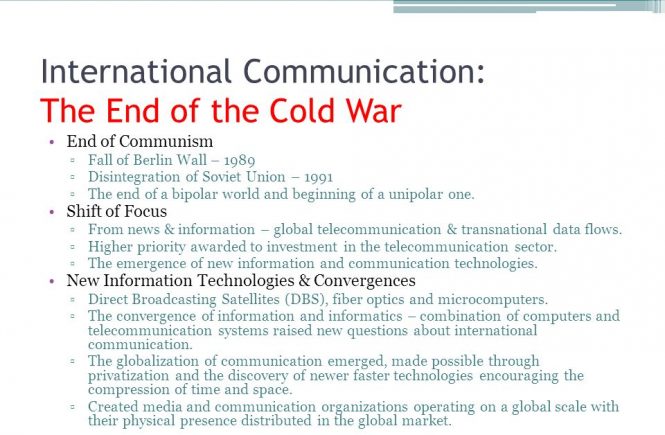If the East-West ideological battle characterized the Cold War years of international communication, the fall of the Berlin Wall in 1989 and the breakup of the Soviet Union two years later, transformed the landscape of international politics, profoundly influencing global information and communication. Television played an important role during the 1989 revolutions in Eastern Europe. (Ash, 1990), helping to bring the East-West ideological division of Europe to a close. The transition to capitalism was largely peaceful, except in Romania, where at least some of the violence was simulated. The 1989 Timisoara massacre in Romania was ostensibly staged for the world’s TV cameras, in what the French sociologist Jean Baudrillard called, ‘a hijacking of fantasies, affects and the credulity of hundreds of millions of people by means of television’ (1994: 69). The August 1991 coup in Moscow, which led to the break-up of the Soviet Union, was called ‘the first true […]
The MacBride Commission
The International Commission for the Study of Communication Problems that was established under the chairmanship of Sean MacBride by UNESCO occupies a prominent place in the debate regarding the establishment of a NWICO. The Commission report, commonly known as the MacBride Commission Report, gave intellectual justification for evolving a new global communication order. For this reason the NWICO protagonists considered it to be a seminal document. The Commission was created in 1977 as a direct response to Resolution 100 of the 19th General Session of UNESCO held in Nairobi in 1976. The Commission took two years after going through one hundred working papers especially commissioned for it, to bring out one interim and a final report in 1980. The Commission had the following 16 members: Sean MacBride, chairman (Ireland), Elie Abel (USA), Hubert Beuve-Mery (France), Elebe Ma Ekonzo (Zaire), Gabriel Garcia Marquez (Columbia), Mochtar Lubis (Indonesia), Mustapha Masmoudi (Tunisia), Betty […]
New World Information and Communication Order
The demand for a New World Information and Communication Order The international information system, the NWICO protagonists argued, perpetuated and strengthened inequality in development, with serious implications for the countries of the South, which were heavily dependent on the North for both software and hardware in the information sector. It was argued by Third World leaders that through their control of major international information channels, the Western media gave an exploitative and distorted view of their countries to the rest of the world. The existing order, they contended, had, because of its structural logic, created a model of dependence, with negative effects on the polity, economy and society of developing countries. Their demands were articulated by Tunisian Information Minister Mustapha Masmoudi, who was later a member of the MacBride Commission. The chief complaints from the long litany of the Third World demands were as follows: • owing to the socio-technological […]
Satellite Instructional Television Experiment (SITE)
The use of modern technologies for development purposes was pioneered by the Indian Government when in 1975 it launched the Satellite Instructional Television Experiment (SITE). The programme, supported by UNESCO, aimed to use satellite technology to assist development by transmitting daily programmes on health, agriculture and education to rural communities. India’s Department of Atomic Energy negotiated a deal with the US National Aeronautics and Space Administration (NASA) which loaned India one of its satellites, Applications Technology Satellite-6 (ATS-6), for a year to make these broadcasts in exchange for sharing the knowledge from the project. The SITE programmes lasted from 1 August 1975 to 31 July 1976, and the estimated cost to India of the world’s largest techno-social experiment was about $6.6 million. The government chose 2400 villages, selected from 20 districts of some of the poorest regions of six contiguous provinces – Orissa and Bihar in the east, Madhya Pradesh […]
International Communication and Development
For nearly half a century, the Cold War divided the world into hostile East-West blocs. This had significant implications for the development of Third World countries, most of whom wanted to avoid bloc politics and concentrate on the economic emancipation of their populations. The phrase ‘Third World’ itself was a product of the Cold War, said to have been coined by French economic historian Alfred Sauvy in 1952, when the world was divided between the capitalist First World, led by the United States and the communist Second World with its centre in Moscow. The ‘Third World’ was the mass of countries remaining outside these two blocs1 (Brandt Commission, 1981; South Commission, 1990). National liberation movements in Asia, Africa and Latin America had altered the political map of the world. The vast territory occupied in 1945 by European colonial powers extended over 36 million sq. km; by 1960 as a result […]
Cold War Propaganda in the Third World
Another major battle for the hearts and minds of people during the Cold War was fought in the Third World, where countries were emerging from centuries of subjugation under European colonial powers. The Soviet Union had recognized that, since the nature of the anti-colonial movements in Asia and Africa was largely anti-Western, the political situation was ripe for promoting communism. The West, on the other hand, was interested in continuing to control raw materials and develop potential markets for Western products. Radio was seen as a crucial medium, given the low levels of literacy among most of the population of the developing countries. In addition, the nascent media in the newly independent countries in Asia and Africa were almost always state-controlled and thus less able to compete with foreign media, with their higher credibility and technological superiority. The Middle East was a particular target for Western broadcasters, given its geo-strategic […]
